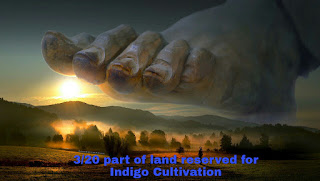Tinkathia system

Abolition of Tinkathia system Thinkathia system was a system in champaran (Bihar) in which farmers were forced to cultivate indigo on 3 kathaa out of every 20 kathaa (bigha) of land. In late 1880 due to development of synthetic dye in Germany leads to price fall and increased competition on indigo dye in the market. The planters began to increase rent burden and practice traditional Zamindari to recover their profit which leads to farmers condition in debit and poverty. An indigo cultivator RajKumar Shukla from champaran consulted M. K. Gandhi regarding champaran issue. Gandhi came to champaran to carry out inquiry of indigo farmers but the police superintendent wanted that Gandhi must leave the district. Gandhi refuse to leave champaran and began his work in motihari (headquarter of district). Gandhi appeared in motihari court where about 2000 local people accompanying him. The Motihari trail collapsed due to abnormal situation before the magistrate. Sir Ed...



